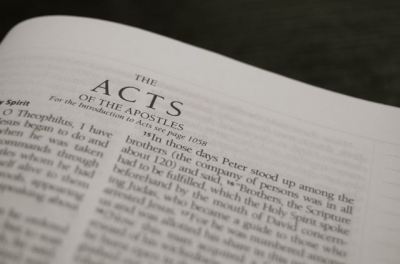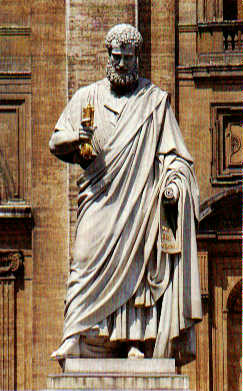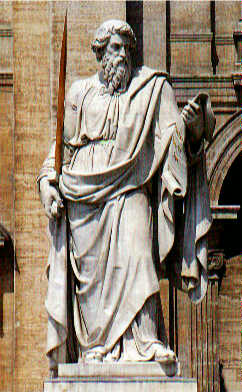
We see the same thing happen in the cities of Samaria, Antioch, and Ephesus. We even see it in people as far from Christ as Saul of Tarsus, who persecuted the church.
In all these events—and so many more—we see the Spirit coming in power and igniting a fire that swept the ancient world. Let’s look at what the Holy Spirit did to turn regular, everyday people into joyful, committed followers of Jesus and fearless proclaimers of the gospel.
The Power of Revelation. St. John tells us that at the last supper, Jesus promised his disciples, “If anyone loves me, he will keep my word, and my Father will love him, and we will come to him and make our home with him” (John 14:23). A few years later, reflecting on his experience of this promise, St. Paul wrote, “God’s love has been poured into our hearts through the Holy Spirit” (Romans 5:5). Jesus’ promise had been fulfilled! The Holy Spirit had been poured out, and the outpouring had brought the first Christians an overwhelming awareness of the love of God.
God loved them! This revelation changed their whole lives. It was no longer merely a statement of fact. It wasn’t just something Jesus told them. The revelation of God’s love was so real to them that it removed guilt, freed them from fear, and overcame their sin. It warmed their hearts to accept one another—even the Gentiles, whom they had were never considered worthy of God’s attention (Acts 11:18). So great was the love they experienced that their love for each other was turned into action as they prayed together and cared for the poor among them (2:44-47).
This love of God, poured out by the Holy Spirit, is the foundation of the entire gospel message. It is the very reason for the church’s existence, the key to all theological questions, and the answer to every crisis that has visited individuals and nations. This love is unmerited, an affection from the Father that persists, despite our sin and rebellion. As Paul wrote, “God shows his love for us in that while we were yet sinners, Christ died for us” (Romans 5:8).
The book of Acts is a constant testimony to the fact that when the Spirit reveals God’s love, all of life takes on a new perspective. Our past sins are fully covered and forgiven. Our future is secured. And we are given the courage to work through the cares and concerns of the present. Because we have experienced overflowing, divine love, we are filled with an “unutterable and exalted joy” (1 Peter 1:8) that suffuses every aspect of our lives.
A Life of Surrender. As they experienced indwelling Spirit, the disciples were compelled to surrender their lives to Jesus and to the mission of his church. Their interior lives were changed to the point that they decided to “live no longer for themselves but for him who for their sake died and was raised” (2 Corinthians 5:15). It was not enough simply to take up a different, more idealistic, lifestyle. The Holy Spirit had so invaded them that—weak and sinful though they were—they wanted to set themselves apart for the Lord, offering themselves as a “living sacrifice” to him (Romans 12:1).
St. Paul explained this surrender to Jesus by making a proclamation that can still touch our hearts today: “It is no longer I who live, but Christ who lives in me… . I live by faith in the Son of God who loved me and gave himself for me” (Galatians 2:20). For Paul, and all the early Christians, the Holy Spirit, who overwhelmed them, also convinced them to yield each day to Jesus. The Spirit had revealed Jesus to them, not only as someone who loved them deeply but also as the Lord of all creation, worthy of their obedience, love, and devotion. Describing this process of obedience, Paul wrote:
Whatever gain I had, I counted as loss for the sake of Christ. Indeed, I count everything as loss because of the surpassing worth of knowing Christ Jesus my Lord. For his sake I have suffered the loss of all things… . in order that I may gain Christ and be found in him. (Philippians 3:7-8)
Paul, Peter, and all the disciples sought to open every aspect of their lives to the Holy Spirit and allow the love they had received in their hearts to renew their minds, their desires, their decisions, and their relationships. They learned to “take every thought captive to obey Christ” (2 Corinthians 10:5), and allowed themselves to be “transformed by the renewal of [their] minds” (Romans 12:2).
To the Ends of the Earth. Despite arrest (Acts 4:1-4), beatings (5:40), and the threat of death (9:1), the early Christians continued to proclaim Jesus Christ crucified and risen. As they continually opened their lives to the power of the Holy Spirit, they experienced a burning desire to share the gospel with others. Not two months after seeing his Master arrested and crucified, Peter boldly told those responsible for the cross, “God has made him both Lord and Christ, this Jesus whom you crucified” (2:36).
Similarly, having just seen their brother Stephen die at the hands of the Jewish elders, all the disciples who fled Jerusalem “went about preaching the word” (Acts 8:4). In Samaria, “the multitudes with one accord gave heed to what was said by Philip, when they heard him and saw the signs which he did.” As a result, “there was much joy in that city” (8:6,8). Later, Luke tells us, “Those who were scattered … traveled as far as Phoenicia, Cyprus, and Antioch, speaking the word” (11:19). Because of this small group of men and women, the fire of revival spread through all of Asia Minor.
Why did the disciples risk so much, even to the point of persecution and death? Again, St. Paul gives the answer: “The love of Christ controls us because we are convinced that one has died for all” (2 Corinthians 5:14). The ever-deepening experience of God’s love, coupled with an ongoing surrender of their lives to Christ, led the disciples to want to tell everyone they could about the salvation that was available to them in Jesus.
Come, Lord Jesus! The Holy Spirit touched the disciples so deeply that they experienced a longing to be with Jesus and see him face to face. This Spirit, who is “the guarantee of our inheritance until we acquire possession of it” (Ephesians 1:14), gave them a taste of what eternal life with Jesus would be like, and so the early church cried out, “Amen, come, Lord Jesus!” (Revelation 22:20).
The first Christians understood that life in this world was only temporary, and that their true and final home was in heaven, united with the Lord. It was, in fact, this faith and hope in Jesus’ return that sustained the church in times of hardship and persecution: “If we endure, we shall also reign with him” (2 Timothy 2:11-12). What could be more hopeful than the promise of life eternal, glorified with the one who has loved us so faithfully?
Ordinary People Transformed. In this season between Easter and Pentecost, we have a wonderful opportunity to open our hearts more fully to the Spirit’s transforming power. God’s purposes never change. Everything that the first disciples experienced is still available to us today. Just as it happened for them, it can happen for us.
We must understand that the disciples were not extraordinary people. They were just tradesmen, merchants, and government workers—parents, teachers, and political activists. They didn’t come together and devise a plan to turn their world upside down. They were weak and sinful, just like us, and they knew that only the Holy Spirit could do the work Jesus had entrusted to them. This is why, instead of striking out on their own, they followed Jesus’ words to remain in Jerusalem, praying and waiting for the Spirit to fall (Luke 24:49).
In this Easter season, as we celebrate the risen Lord, let us imitate the disciples and spend some extra time in prayer. Let’s ponder God’s word and ask him to fill us even more with the Holy Spirit. Let us all look forward to the fulfillment of Jesus’ promise: “You will receive power when the Holy Spirit has come upon you” (Acts 1:8).

 Each of these sermons and speeches include many, if not all, of the following key points:
Each of these sermons and speeches include many, if not all, of the following key points:
